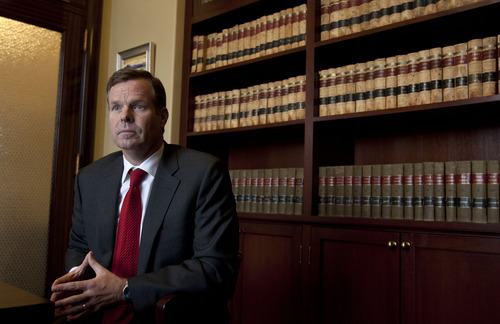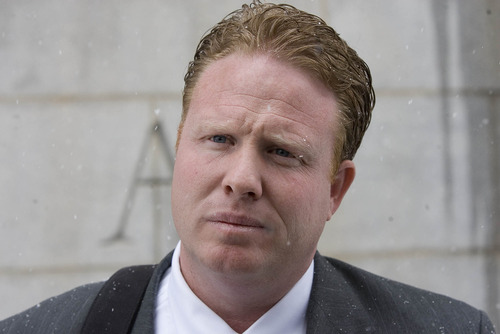This is an archived article that was published on sltrib.com in 2013, and information in the article may be outdated. It is provided only for personal research purposes and may not be reprinted.
The day doctors told Richard Rawle his cancer treatments had failed and there was nothing more to be done, the millionaire owner of Provo-based Check City signed an unusual deathbed declaration in which he denied that he and indicted St. George businessman Jeremy Johnson had conspired to bribe Senate Majority Leader Harry Reid.
The document is a key cog in embattled Utah Attorney General John Swallow's campaign to try to prove he wasn't involved in the alleged bribery scheme to help thwart a federal investigation into Johnson's businesses.
"Facing his maker, [Rawle] had his people prepare an affidavit for him, which he reviewed, changed, modified and signed," Swallow told KUTV News, "and it said this [alleged scheme] didn't happen."
Swallow did not answer detailed questions emailed to him about the declaration.
But the deathbed affidavit — signed just three days before Rawle died after a horrific battle with lymphoma — raises questions on its own, including whether Swallow asked for it or if Rawle volunteered it. The timing and content also raise eyebrows about its reliability, making it highly unlikely, according to a former prosecutor, that it could be used in any court proceeding.
Those questions aside, the document spells out that Swallow received part of the funds from the deal while he was Utah's chief deputy attorney general. He did not report them on a financial disclosure form when he ran for attorney general.
Johnson and his I Works company were sued by the Federal Trade Commission in December 2010 for allegedly defrauding consumers with online offers. He was charged with one count of felony mail fraud a few months later. Johnson has denied the allegations in both the civil and criminal cases.
Johnson alleges Swallow helped broker a bribe in 2010 in a bid to derail the federal probe. The plan, according to Johnson, included an attempt to pay Reid $600,0000 to use his influence to get the FTC to back off.
Reid's office has denied that the Nevada Democrat knew anything about the matter.
For his part, Swallow maintains all he did was connect Johnson to Rawle in order to hire lobbyists to help the St. George businessman with his case before federal regulators. And Swallow, who had been a lobbyist for Rawle's payday-loan chain, points to the deathbed declaration to support his story and denies he ever got a fee for connecting Johnson to Rawle.
In the declaration, Rawle says he kept $50,000 of an initial $250,000 payment from Johnson as his fee. Rawle used $23,500 of that to pay P-Solutions, a Swallow company, from an account for RMR Consulting, a company Rawle formed at the time the deal was struck and into which I Works deposited the money.
On March 15, 2012, the same day he filed his financial disclosure forms in the attorney general's race, Swallow transferred management of P-Solutions to his wife. As a result, P-Solutions is not reflected on those candidate forms. Swallow also did not report any payments from Rawle on those disclosures.
Rawle's declaration says there was no plan or effort to bribe state or federal officials and that Swallow had no role other than introducing him to Johnson.
"None of the money was paid or intended to be paid to John Swallow for his introduction of I Works or Mr. Johnson to me," Rawle says. Instead, the declaration adds, the payments were for consulting work Swallow had done for Rawle on a proposed cement plant in Nevada.
"I considered the money earned," Rawle says, "and saw no problem paying personal bills with that company."
Rawle also says $100,000 was wired to lobbyists to help Johnson.
Johnson has previously said that the dispute about whether a bribe was contemplated or the effort was merely to hire lobbyists could have been settled if Rawle or Swallow had responded to his requests to identify the lobbyists.
Swallow did not respond to an emailed request for that information. Sam Alba, an attorney for the Rawle family and their companies, did not answer questions submitted Tuesday in an email.
The U.S. Senate Office of Public Records has no record of lobbyists registered on behalf of Rawle, Johnson, RMR Consulting or I Works. Such disclosures are required of those who lobby Congress or the administration.
Rawle's declaration also says that P-Solutions approached him last May about returning the money that RMR had paid Swallow and asking to be paid from another account. Swallow did not respond to a question about why he repaid the money if the transaction was legitimate — as Rawle claims.
The Rawle affidavit shows signs of hasty preparation. Paragraphs are not always arranged logically and some wording is repeated.
A speaker at Rawle's funeral said that on the Wednesday before his Saturday, Dec. 8, death, Rawle and his family were told that doctors could do nothing more to halt his cancer. Friends started showing up for final goodbyes.
That would be the same day as the declaration date. A blog set up by a family member to chronicle Rawle's battle against lymphoma offers a harrowing description of what he went through, including chemotherapy, swelling limbs and intense pain.
Eric Benson, an attorney at Ray, Quinney & Nebeker who specializes in white-collar-crime cases and civil litigation, says Rawle's subsequent death makes it unlikely the declaration could be introduced as courtroom evidence.
"It constitutes hearsay," Benson says, because Rawle no longer can be cross-examined.
Benson, a former assistant U.S. attorney, worked early on in the criminal case against Johnson but then entered private practice. He declined to speak specifically about the case but talked generally about rules for evidence.
If Rawle's declaration were to be admitted as evidence, Benson says, then questions could be raised about how it came about and the fact it was signed when the patient was likely under heavy medication.
"Always we're going to look at the evidence's reliability," Benson says, "whether the statement was reliable, whether he was of sound mind, capable of making the statement."
The investigation already under way?
Utah Attorney General John Swallow has asked the U.S. Attorney's Office to investigate the allegations against him. That office responded that it would take "appropriate action." Several individuals, however, have told The Salt Lake Tribune that they had already been interviewed by the FBI about Swallow's relationship with businessman Jeremy Johnson, among other issues.





